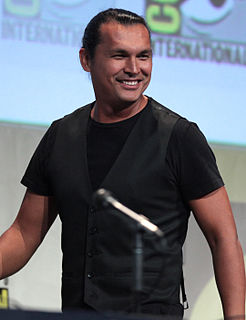A Quote by Jodi Picoult
It was a catch-22: If you didn’t put the trauma behind you, you couldn’t move on. But if you did put the trauma behind you, you willingly gave up your claim to the person you were before it happened.
Related Quotes
If we take a hard look at what poverty is, its nature, it's not pretty - it's full of trauma. And we're able to accept trauma with certain groups, like with soldiers, for instance - we understand that they face trauma and that trauma can be connected to things like depression or acts of violence later on in life.
no one wanted to look at the common evils of society. Very few were willing to put aside their own pursuit of happiness long enough to consider the effects of greed and jealousy around them. From what she'd seen, humans were essentially troubled. For every one behind bars, another ten deserved to be behind bars, but that would put one in ten Americans behind bars.
We [Americans] have a historical trauma when it comes to the past relationships when it comes to Native Americans and the history of how America was created. With this film, it's nice to see that the trauma is presented from a white male that was in the Civil War and that trauma affects him in a way that still exists.
Some people's lives seem to flow in a narrative; mine had many stops and starts. That's what trauma does. It interrupts the plot. You can't process it because it doesn't fit with what came before or what comes afterward. A friend of mine, a soldier, put it this way. In most of our lives, most of the time, you have a sense of what is to come. There is a steady narrative, a feeling of "lights, camera, action" when big events are imminent. But trauma isn't like that. It just happens, and then life goes on. No one prepares you for it.



































